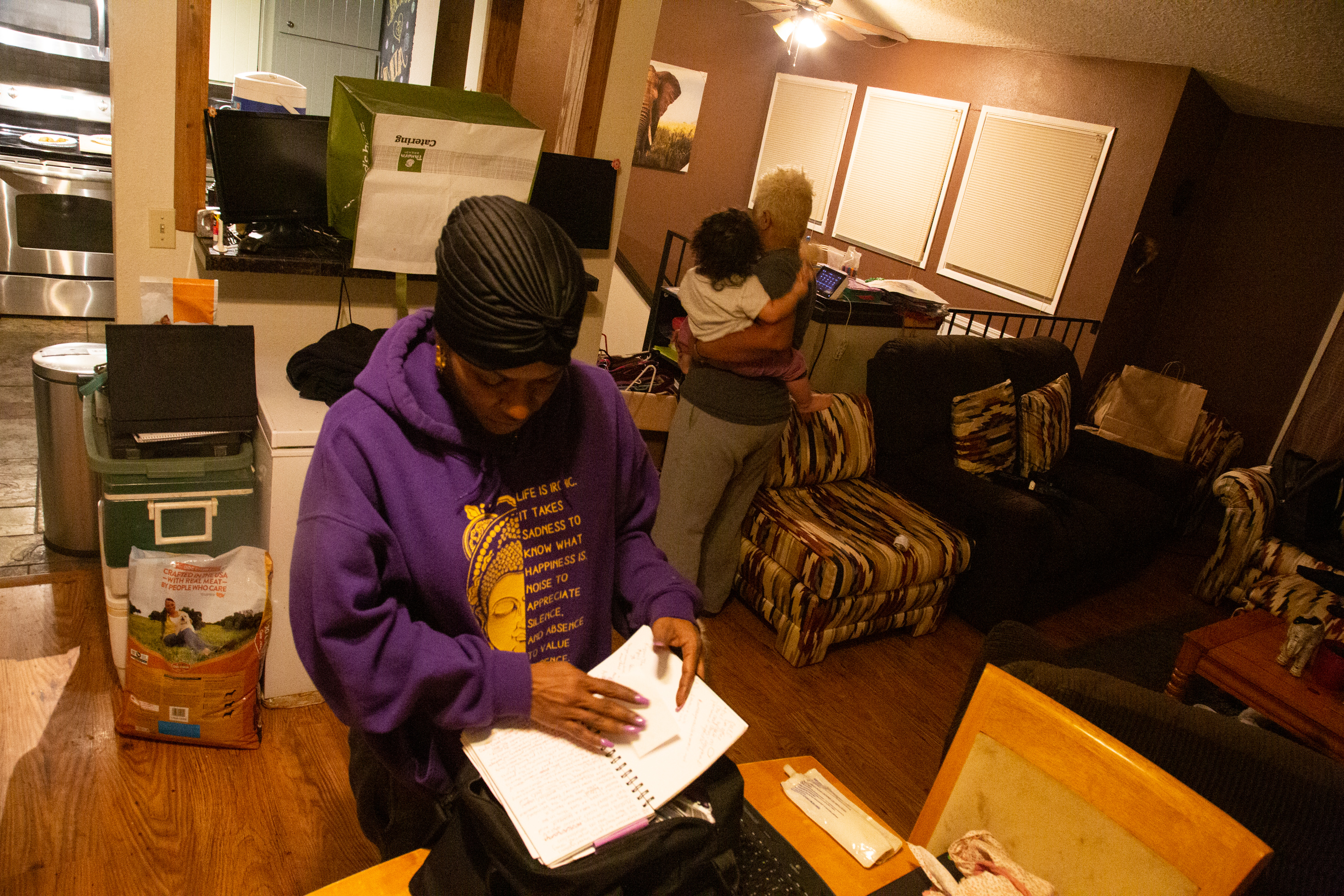
Nickeia Hunter, left, leafs through records and notes she has about her brother's death in Clark County, Wash., in 2019. Carlos Hunter's death has made her a vocal police critic.
Troy Brynelson / OPB
The family of a man shot and killed by police in 2019 during a purported drug investigation plans to sue the Vancouver Police Department and the Washington Department of Corrections.
Carlos Hunter, 43, died after four law enforcement officers stopped his SUV to execute a search. In a matter of seconds after the traffic stop, officers tased him four times and shot him 16 times.
The officers — three Vancouver Police Department officers and one state corrections officer — told investigators that Hunter had reached for a gun. The lawsuit contends Hunter never grabbed a gun, and questions whether he reached for it.
“Things that are done in the dark always come to light,” said Hunter’s sister, Nickeia Hunter, in an interview. “What they did that day, none of it was just. None of it was right.”
The lawsuit paints the officers as reckless and negligent in the stop. The family’s attorneys contend the officers’ actions defy departmental policies and escalated the encounter.
“The evidence shows that the officers created the chaos that they later claimed justified Mr. Carlos Hunter’s tasing, shooting, and death,” the lawsuit filed in Clark County Superior Court reads.
The lawsuit is the second in the past month to accuse police in Southwest Washington of a pattern of negligent policing leading to violence. On Feb. 17, the family of Jenoah Donald filed suit against the Clark County Sheriff’s Office for his shooting death during a 2020 traffic stop.
Both Vancouver police and the Clark County Sheriff’s Office have been under an intense, public microscope because of recent fatal encounters. Several civil rights organizations in November called for a U.S. Department of Justice probe into what they call a pattern of deadly force, disparate policing and showing favor to extremist groups.
The Hunter lawsuit names the city of Vancouver, the state corrections department, and the four officers involved: Vancouver officers Dennis Devlin, Colton Price and Branden Schoolcraft, and corrections officer Rees Campbell.
According to the lawsuit, Hunter left his home March 7 to go pick up one of his children from school. The four officers, with a signed search warrant in hand, stopped him around 1:30 p.m., about a mile from his home.

Many family and community members wore clothing with photos of Carlos Hunter to honor his memory.
Molly Solomon / OPB
The lawsuit alleges the officers “engaged (Hunter) in a manner that fell far short of basic de-escalation tactics and police standards.”
While officers initially declared the scene safe — the lawsuit notes officers announced a “Code 4″ and that the stop was under control — it quickly devolved.
“Within a few minutes of contacting Mr. Carlos Hunter, the officers surrounded his vehicle,” the lawsuit reads.
In a matter of roughly 70 seconds, according to the lawsuit, officers deployed Tasers and fired their handguns at Hunter. Hunter, meanwhile, remained in his car and wearing his seatbelt. At one point, Price later told investigators, Hunter said he was “scared to death” of the officers.
The lawsuit states that Price shattered a passenger-side window “to intimidate (Hunter).” Devlin at one point yelled “gun!” Campbell, the corrections officer, deployed a Taser to Hunter’s chest twice in a 20-second span, the lawsuit said.
Officers then fired 16 rounds into the car. Afterward, the lawsuit contends, they pulled Hunter from the vehicle and handcuffed him. Attorneys wrote that the officers did not render first aid.
“The officers then dragged Mr. Carlos Hunter from the vehicle, put him in handcuffs while he was lying face-down on the street, and left him there to die without rendering first aid of any kind,” the lawsuit reads.
A major point of contention for the Hunter estate is whether he pointed a gun. His attorneys contend that there was no imminent threat – thus no need for officers to deploy deadly force.
Though Hunter had a gun, he never grabbed it, the lawsuit reads. The lawsuit questions whether Hunter ever even reached for it.
“Photographs taken at the scene show it was still located securely within (Hunter’s) pocket even after his death,” the lawsuit reads. “This and other facts, including that Hunter was almost certainly suffering from the physical effects of multiple high-voltage (Taser) applications when the officers started shooting, demonstrate the officers’ total failure to control the scene.”
The shooting was ultimately declared justified by the Clark County Prosecutor’s Office.
Nickeia Hunter, who has since become an active civil rights advocate and a commissioner with the Washington Criminal Justice and Training Commission, said the civil filing is the family’s effort to get justice for her brother and his children.
“It’s not going to be an easy fight,” she said. She noted that her lawsuit won’t have any impact on her role as a commissioner at the agency that helps set training standards for officers around the state.
“I’m making my voice heard for the people of Southwest Washington,” she said.
A spokesperson for the city of Vancouver said it had not been provided a copy of the lawsuit, but noted that prosecutors had stated officers’ acted “in response to a fear of deadly assault” when they deemed the shooting justified.
“While the loss of any life is tragic, the city agrees with the conclusion of the prosecuting attorney and intends to defends its officers in this litigation accordingly,” said spokesperson Laura Shepard.
A representative for the Washington Department of Corrections was not immediately available for comment.
